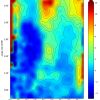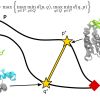
Fiona Naughton
Fiona was a postdoc in the lab. Her research interests include free energy calculations, enhanced sampling methods and software development for MD. Her current project aims to use computational methods to characterise the structural and energetic underpinnings of bile acid transporters.





